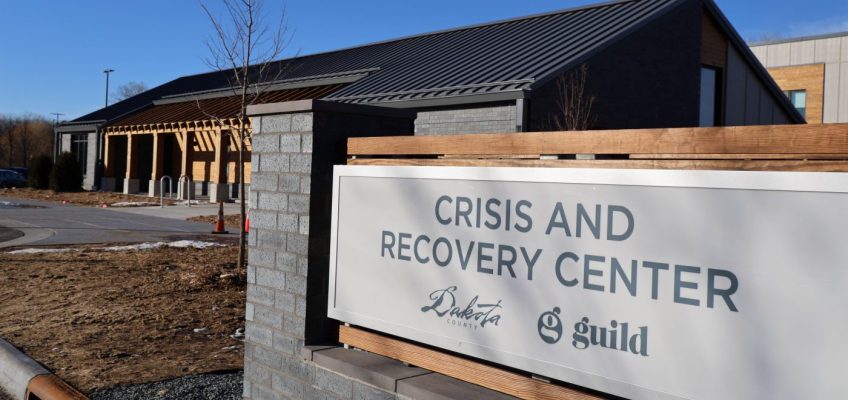Dakota County residents would travel as far as St. Cloud to seek mental health care services, West St. Paul Mayor Dave Napier said during a ribbon-cutting ceremony for the county’s new Crisis and Recovery Center.
Now residents have direct access to care that’s close to home, he said.
“Mental health has had a stigma around it and we have to overcome that,” Napier said during the ceremony.
Dakota County and Guild, a statewide mental health service provider, debuted their new Crisis and Recovery Center, at 2025 Livingston Ave. in West St. Paul, during a celebratory ribbon-cutting ceremony on Monday morning. The Crisis and Recovery Center serves adults in need of mental health care, services, treatment and short-term residency.
“It says a lot to the community just having a building – that we care about people and we care about people’s mental health,” according to Dakota County Director of Social Services Emily Schug. Schug said.
The 16,000-square-foot building, which cost $14 million, received funding from state bonding, the Minnesota Department of Human Services, federal American Rescue Plan funds and donations from the O’Gara family.
It includes 16 private bedrooms and adjoining bathrooms, two of which are ADA accessible, an onsite nurse, 24-hour staffing and community spaces, along with other resources.
The building is split into two service areas, urgent crisis response and short-term residential treatment.
Crisis response
The Dakota County Place to Go, located on the south side of the building’s entrance, serves adults in immediate crisis. The center’s licensed mental health professionals can conduct mental health assessments, provide short-term therapeutic assistance and connect those in need with longer-term services, according to Jamie Rud-Collett, the county’s crisis response unit supervisor.
“Everybody’s different and every case looks different,” Rud-Collett said. “The crisis team is really about what’s happening right now and what needs to happen to keep everyone safe.”
Dakota County’s crisis response team operates 24 hours a day and can be reached at 952-891-7171. The team conducts crisis intervention and consultation in person, in homes around the community, over the phone and now in the county’s recovery center.
“My view of the space is an urgent mental health care,” Rud-Collett said.
Rud-Collett said the space provides an alternative to going to a hospital emergency room and focuses solely on mental health provision.
“We like to let people define their crisis,” Schug said.
Short-term residential treatment
Guild services, which include the private bedrooms used for temporary housing up to 90 days, are located on the north end of the entrance.
Residents seeking treatment will have regular access to therapy, as well as medical help through an on-site nurse who can provide medical assistance and prescribed medication during the day.
Meals are prepared and provided three times daily to residents. Families and loved ones can visit those in treatment and spend time together in the multiple gathering spaces, outdoors, in conference rooms and in the kitchen, which is open to public use.
Using trauma-informed design principles, the building captures calming energy through numerous windows allowing light into the space, nature-inspired murals and accessible features like an elevator, Schug said.
Shining a light on mental health
Sara Hillstrom, of West St. Paul, said she first sought help for mental health after getting out of an abusive relationship. She lived in Guild South in South St. Paul in 2015 for two weeks and has received social services for mental health for many years of her life.
“I thought it was great because they would help me with anything, like any resources I needed I could just call,” Hillstrom said.
Hillstrom said now she lives independently, has received support from Guild in finding a job and no longer works with a social worker.
“Those things to me are things to brag about because I have come that far, because of these services,” Hillstrom said. “They have set me up for success.”
Guild Chief Advancement Officer Dawn Marie-Nelmark said that there was hesitation at first to have the recovery center in the community, but Hillstrom played a large role in advocating for the need.
Related Articles
Friends say man found dead in Hastings was a ‘bright light’
Lakeville police officer, high school hockey coach critically injured in fall during practice
Hockey loving Eagan native Eva Erickson among the castaways competing on ‘Survivor 48’
Stillwater woman’s parachute ‘fully’ deployed before fatal incident, company officials say
Lakeville school board votes to remove Black Lives Matter posters following controversy, lawsuit
“It was important for me to shed light on how we’re everyday people walking in your community, shopping at the stores you shop at, but yes we have crises sometimes and we need that extra help, but we still coexist with you every day and you wouldn’t know,” Hillstrom said.
Hillstrom said she was amazed by the new facility and is excited about how it will impact the lives of others in the community.
“I’m so passionate about mental health because it has affected me so deeply,” Hillstrom said.
Rud-Collett and Schug said that the center has received a lot of support from the surrounding community.
“We hope to reduce the stigma and increase the access,” Schug said.
According to Schug, treatment services are typically paid for under an individual’s public health insurance benefits. If those seeking services have questions about payment and eligibility, the Crisis Center staff can provide additional information.
The Crisis Center is scheduled to begin services on Feb. 10.


Leave a Reply